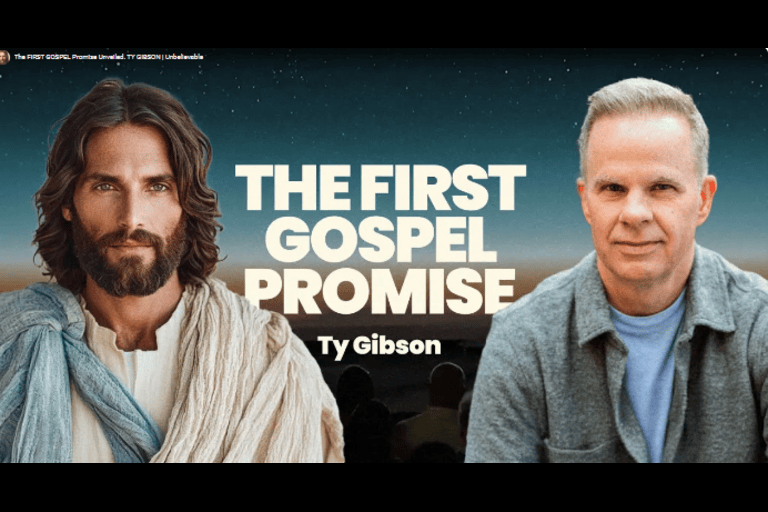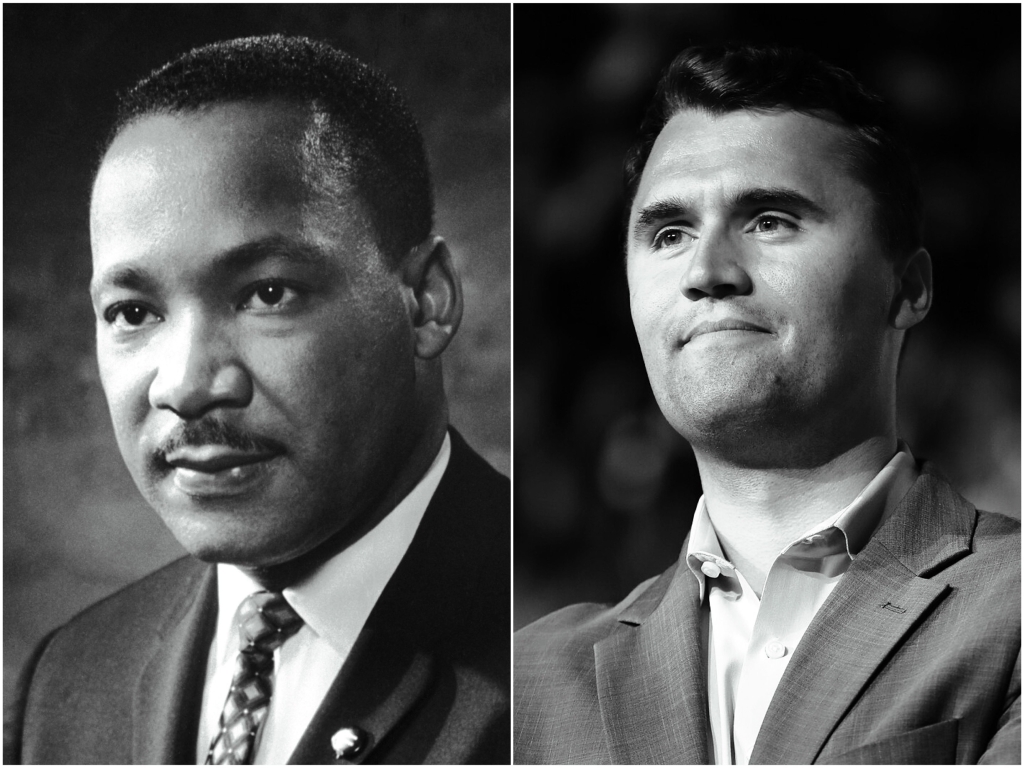Two Voices Silenced, One Eternal Truth Echoing On
Imagine standing on a stage, heart ablaze with conviction, pouring out words that challenge the status quo and call a nation back to its moral compass. The air is thick with anticipation, the crowd hanging on every syllable. Then, in an instant, a single act of hatred shatters the moment, claiming a life dedicated to truth. This isn’t a scene from a distant history book—it’s the shared tragedy that bound two remarkable men: Dr. Martin Luther King, Jr., and Charlie Kirk. Both were assassinated not for malice or power, but for what they believed to be true—a truth rooted deeply in the teachings of Jesus Christ.
On April 4, 1968, Dr. King, the iconic Baptist minister and civil rights leader, was gunned down on a Memphis balcony, his dream of equality still unfolding. Just months ago, on September 10, 2025, Charlie Kirk, the fiery young conservative activist and founder of Turning Point USA, fell to bullet at Utah Valley University, mid-sentence in a speech defending Judeo-Christian values. In a world quick to divide heroes into camps—liberal icons versus conservative crusaders—their stories whisper a profound unity: a shared devotion to loving God and fellow man, pursuing social justice with integrity, and extending grace even to enemies.
As we reflect on their lives, we’re not just mourning losses; we’re invited into a legacy of faith. In the spirit of Jesus Christ, who taught us to “love your enemies and pray for those who persecute you” (Matthew 5:44), let’s explore the Christian and Bible-based threads that wove through their convictions. Their values—social justice, personal responsibility, honesty, integrity, and an unwavering call to a personal relationship with Christ—offer us a blueprint for healing a fractured world. Through open dialog with those we disagree with, we can honor their sacrifices. Join me in this loving exploration, dear reader, as we uncover how two men, worlds apart in context yet bound by Scripture, remind us that truth, spoken in love, endures forever.
Background Information: Lives Shaped by Faith and Fire
To appreciate the profound similarities between Dr. King and Charlie Kirk, we must first step into their worlds. Both men were products of their times—turbulent eras demanding moral courage—yet their foundations were unshakeable: a personal relationship with Jesus Christ that propelled them into public life. Let’s journey through their backgrounds, seeing how early encounters with the Gospel ignited lifelong passions for truth.
The Formative Years of Martin Luther King, Jr.: From Atlanta Pulpits to National Stages
Born on January 15, 1929, in Atlanta, Georgia, Michael King, Jr.—later renamed Martin Luther after his father’s pilgrimage to Germany—was immersed in the Black Baptist church from infancy. His father, a fiery preacher, and his mother, a pillar of quiet strength, instilled in young Martin a love for God and fellow man. By age 15, he was delivering sermons; by 19, he graduated from Morehouse College, wrestling with the intellectual rigor of theology at Crozer Theological Seminary.
Dr. King’s defining moment came at Boston University, where he earned his Ph.D. in systematic theology. But it was the Montgomery Bus Boycott of 1955 that thrust him onto the world stage. Inspired by Jesus Christ’s Sermon on the Mount, he championed non-violent resistance, drawing from Gandhi but grounding it in biblical principles. “The arc of the moral universe is long,” he famously said, “but it bends toward justice”—a paraphrase echoing Isaiah 40:4’s promise of God’s leveling the uneven ground.
Throughout the 1960s, Dr. King led the Southern Christian Leadership Conference (SCLC), marching for voting rights, desegregation, and economic justice. His “I Have a Dream” speech at the 1963 March on Washington wasn’t just political rhetoric; it was a prophetic vision straight from Galatians 3:28: “There is neither Jew nor Gentile, neither slave nor free, nor is there male and female, for you are all one in Christ Jesus.” Assassinated at 39, his death galvanized the Civil Rights Act of 1968, but his true legacy? A call to social justice that loved the oppressor while dismantling oppression.
Dr. King’s life was a testament to integrity: he lived what he preached, even as FBI surveillance and death threats loomed. In private letters from Birmingham Jail, he urged personal responsibility, reminding us that “injustice anywhere is a threat to justice everywhere.” His faith wasn’t performative; it was the air he breathed, encouraging every soul to forge a personal relationship with Christ amid the storm.
Charlie Kirk: From Suburban Illinois to the Frontlines of Cultural Renewal
Fast-forward to a different America: Prospect Heights, Illinois, 1993. Charlie Kirk, born on October 14, grew up in a middle-class family where church was Sunday routine, not revolution. Yet, a chance encounter at 18 changed everything. Frustrated by what he saw as liberal bias on college campuses, Kirk founded Turning Point USA in 2012 from his parents’ garage. What began as a student group ballooned into a movement, mobilizing millions for conservative causes.
But Charlie wasn’t just a political operative; he was a self-proclaimed “sinner saved by grace,” an evangelical Christian whose faith fueled his fire. In interviews, he often shared how a profound conversion experience—surrendering to Jesus Christ during a youth group retreat—reoriented his life. “I believe in the Bible,” he declared in a 2023 podcast, “and I believe that Christ rose from the dead on the third day. This is the foundation of my faith.” Like Dr. King, Kirk quoted Scripture prolifically: from Proverbs 22:6 on training up a child to Ephesians 6:12 on battling not flesh and blood, but spiritual forces.
By his early 30s, Kirk had become a media powerhouse, hosting “The Charlie Kirk Show” and speaking at over 500 campuses yearly. He advocated for school choice, fiscal responsibility, and what he called “Judeo-Christian values” against “woke” ideologies. Critics labeled him divisive, but supporters saw a modern prophet, much like the Old Testament figures who confronted kings with God’s word. His marriage to Erika Frantzve in 2021 and fatherhood to two young children grounded him, echoing the biblical mandate to “love your wife as Christ loved the church” (Ephesians 5:25).
Tragically, on that fateful September day in 2025, as he shared 2 Corinthians 5:15—”And he died for all, that those who live should no longer live for themselves but for him who died for them”—gunfire ended his words. At 31, Charlie Kirk’s death sparked national mourning and debate, but it also illuminated his core: a man of honesty and integrity, unafraid to encourage open dialog with those he disagreed with, always pointing back to Christ.
In these backstories, we see parallels emerge: both men, shaped by Scripture from youth, stepped into arenas of controversy not for fame, but for faithfulness. Dr. King’s fight against racial injustice and Kirk’s battle for cultural renewal were expressions of the same divine imperative—to love God wholeheartedly and our fellow man as ourselves (Matthew 22:37-39).
Core Beliefs and Values: A Shared Biblical Foundation
What did Dr. King and Charlie Kirk believe to be true? At their hearts, both were unapologetic disciples of Jesus Christ, whose teachings on love, justice, and truth formed the bedrock of their worldviews. Though their contexts differed—Dr. King confronting Jim Crow, Kirk navigating cancel culture—their values converged on timeless biblical truths. Let’s delve into these, with a caring heart, seeing how they modeled a faith that transforms societies and souls.
Commitment to Loving God and Fellow Man: The Greatest Commandment in Action
Jesus distilled the Law into two commands: “Love the Lord your God with all your heart and with all your soul and with all your mind… Love your neighbor as yourself” (Matthew 22:37-39). This wasn’t abstract for either man; it was lived reality.
Dr. King embodied this in his doctrine of “agape” love—unconditional, sacrificial love that seeks the good of the enemy. In his 1957 sermon “Loving Your Enemies,” he unpacked Matthew 5:44, urging, “Darkness cannot drive out darkness; only light can do that. Hate cannot drive out hate; only love can do that.” This love fueled the Montgomery boycott, where boycotters walked miles not in bitterness, but in prayerful solidarity.
Charlie Kirk echoed this fervor, though through a conservative lens. In a 2024 campus debate, he quoted the same verse, challenging protesters: “Jesus didn’t say love your friends—He said love your enemies. That’s radical, and it’s what America needs to heal.” Kirk’s Turning Point events often ended with calls to prayer, reminding audiences that true patriotism starts with loving God, then extending grace to the immigrant, the dissenter, the “other.” His personal anecdotes—forgiving online trolls, hosting dialogues with liberal students—revealed a man whose love for fellow man was as fierce as his rhetoric.
Both men’s assassinations underscore this: they died loving, not hating, their killers. Dr. King’s last words reportedly included a joke to ease tensions; Kirk, per eyewitnesses, prayed aloud mid-speech. In a divided age, their example whispers: Start with love—for God, for neighbor—and watch walls crumble.
The Call to Social Justice Through a Biblical Lens
Social justice isn’t a modern buzzword; it’s God’s heartbeat, from Exodus’s liberation cries to Micah 6:8’s mandate: “Act justly, love mercy, walk humbly with your God.” Dr. King wielded this like a sword, linking poverty, racism, and war in his 1967 “Where Do We Go from Here?” address. He dreamed of a “Beloved Community” where justice rolls “like waters” (Amos 5:24), advocating for the Poor People’s Campaign to address economic disparities.
Kirk, too, championed social justice, albeit emphasizing personal responsibility over systemic overhaul. He decried “fatherless homes” as a crisis, citing Malachi 4:6 on turning “the hearts of the parents to their children.” Through initiatives like Turning Point Academy, he pushed for educational equity via school choice, arguing it’s biblical stewardship: “To whom much is given, much is required” (Luke 12:48). In a 2025 podcast, Kirk lamented urban decay, quoting Proverbs 29:2—”When the righteous thrive, the people rejoice”—and called for community upliftment rooted in Christ-centered families.
Critics might highlight differences—Dr. King’s federal interventions versus Kirk’s free-market ethos—but both pursued justice as worship. They remind us: Social justice isn’t partisan; it’s prophetic, calling us to bind up the brokenhearted (Isaiah 61:1) while holding ourselves accountable.
Personal Responsibility and Integrity: Living as Salt and Light
Jesus called us “the salt of the earth” (Matthew 5:13), a call to personal responsibility that preserves truth amid decay. Dr. King’s integrity shone in his refusal to compromise: jailed 29 times, he penned masterpieces like “Letter from Birmingham Jail,” defending civil disobedience as biblical fidelity (citing Acts 5:29: “We must obey God rather than human beings!”). He modeled honesty, confessing personal struggles in private sermons, urging congregants toward self-examination.
Kirk mirrored this, often sharing his “sinner” testimony to underscore grace’s power. In speeches, he’d reference James 1:22—”Do not merely listen to the word… Do what it says”—to combat victimhood culture. Turning Point’s “5 Pillars of Personal Responsibility” (faith, family, free markets, etc.) were Kirk originals, but laced with Scripture like 2 Timothy 2:15 on handling truth rightly. His transparency about mental health battles post-2020 election endeared him to youth, proving integrity isn’t perfection, but persistence.
Both men taught that true change begins within: personal responsibility fuels communal flourishing. As Proverbs 11:1 warns against dishonest scales, they lived with scales balanced—honest in word, steadfast in deed.
Loving Your Enemies and Open Dialog: Bridges Over Battle Lines
Perhaps their most Christ-like trait: extending olive branches to foes. Dr. King’s non-violence was no tactic; it was theology, rooted in Romans 12:20—”If your enemy is hungry, feed him.” He dined with segregationists, dialoging over coffee, believing open conversation sows seeds of reconciliation.
Kirk, dubbed “campus warrior,” surprised many by hosting “dialogue dinners” with progressive students. In a 2024 viral clip, he quoted Matthew 5:9—”Blessed are the peacemakers”—while debating abortion, saying, “Disagree with me, but let’s talk like brothers in Christ.” Even amid threats, he advocated prayer for persecutors, modeling Jesus’ cross: forgiveness amid agony.
In an era of echo chambers, their call to open dialog with those we disagree with is revolutionary. It’s not weakness; it’s the power of love conquering hate.
Bible-Based Similarities in Their Missions: Prophets for a New Generation
Beyond values, Dr. King and Kirk shared a missional DNA: using platforms to proclaim Christ’s kingdom. Both were evangelists in activist clothing, urging America toward repentance and renewal.
Non-Violent Advocacy for Change: Swords into Plowshares
Isaiah 2:4 envisions beating “swords into plowshares,” a vision both embodied. Dr. King’s marches were peaceful assaults on injustice, turning cheeks while turning tides. Kirk’s “walkouts” against perceived indoctrination were similarly non-violent, wielding words as weapons, echoing Ephesians 6:17’s “sword of the Spirit.”
Their assassinations? Stark reminders that truth-tellers threaten darkness. Yet, like Christ, they chose love over retaliation, leaving legacies of transformation.
Encouraging a Personal Relationship with Christ: The Heart of the Matter
Finally, both were soul-winners. Dr. King’s sermons ended in altar calls; Kirk’s rallies featured baptisms. They echoed John 14:6—”I am the way, the truth, and the life”—insisting salvation precedes social reform. In a 1963 speech, King said, “The end is reconciliation; the end is redemption.” Kirk, in his final address, affirmed, “Live for Him who died for you.”
Their missions converged: Draw near to Jesus, and justice follows.
Lessons for Today: Practical Tips Inspired by Their Legacies
Dear friend, the stories of Dr. King and Charlie Kirk aren’t museum pieces; they’re living invitations. How can we, in our daily grind, embody their faith? Here are practical tips, infused with love, to weave their values into your life.
Cultivating Honesty and Integrity in Daily Life
Start small: Commit to one “truth moment” daily—perhaps confessing a white lie at work, as Proverbs 12:22 honors truthful lips. Like Kirk journaling Scriptures, keep a gratitude log, noting God’s faithfulness. For integrity, audit your commitments: Say no to overstretch, yes to Sabbath rest (Exodus 20:8). Personal responsibility blooms here—volunteer weekly, echoing Dr. King’s community service ethic. Remember, integrity isn’t solo; share accountability with a mentor, fostering that personal relationship with Christ through morning prayers.
Engaging in Open Dialogues: Building Bridges, One Conversation at a Time
In a polarized world, heed their call: Next disagreement? Pause, pray Matthew 5:44, then ask, “Help me understand your view.” Host a “dialogue dinner” like Kirk—invite a differing neighbor, discuss over shared meals (Romans 12:13). Practice active listening: Reflect back what you hear, validating hearts before countering. Dr. King’s jail letter teaches urgency with grace; apply it by writing notes of encouragement to critics. Social media? Post with Ephesians 4:29—edifying words only. These steps turn enemies into friends, honoring Jesus’ peacemaking.
Pursuing Social Justice with Love: Action Rooted in Agape
Justice without love withers; pair them biblically. Audit your budget: Tithe to anti-poverty causes, as Deuteronomy 15:7 urges open hands to the poor. Like Dr. King’s campaigns, join local advocacy—mentor at-risk youth, vote for family policies per Kirk’s pillars. Personal responsibility shines: Mentor one person monthly in life skills, quoting Luke 12:48. For broader impact, pray for leaders (1 Timothy 2:1-2), then dialog with policymakers. Loving your enemies? Volunteer at a shelter serving “opponents.” These acts ripple, creating beloved communities where Christ reigns.
By implementing these, we don’t just remember King and Kirk; we resurrect their spirits in our spheres.
Conclusion: Carrying the Torch of Truth in Love
As we close this reflection, hearts tender with the weight of two assassinations, let gratitude swell. Dr. Martin Luther King, Jr., and Charlie Kirk—flawed vessels, faithful witnesses—poured out for what they held true: the transformative power of Jesus Christ. Their shared convictions—loving God and fellow man, championing social justice with personal responsibility, upholding honesty and integrity, loving enemies through open dialog, and beckoning souls to Christ—transcend time, politics, and tragedy.
In Dr. King’s words, “We must accept finite disappointment, but never lose infinite hope.” Kirk might add, per 2 Timothy 4:7, “I have fought the good fight… I have kept the faith.” Together, they urge us: Live boldly, love deeply, dialog kindly. In a world crying for healers, be the salt—preserving truth, seasoning with grace.
Friend, I care deeply about your journey. If their stories stir your soul, take one step today: Read Matthew 5, pray for an enemy, reach out in dialog. Encourage that personal relationship with Christ; He’s the ultimate Assassin-defeater, rising victorious. Honor these brothers by living their truths. The arc bends toward justice, but only if we walk it together.
What truth will you stand for? If not you, who?
Quotable Quote:
“All heaven is interested in the happiness of man. Our heavenly Father does not close the avenues of joy to any of His creatures. The divine requirements call upon us to shun those indulgences that would bring suffering and disappointment, that would close to us the door of happiness and heaven. The world’s Redeemer accepts men as they are, with all their wants, imperfections, and weaknesses; and He will not only cleanse from sin and grant redemption through His blood, but will satisfy the heart-longing of all who consent to wear His yoke, to bear His burden. It is His purpose to impart peace and rest to all who come to Him for the bread of life. He requires us to perform only those duties that will lead our steps to heights of bliss to which the disobedient can never attain. The true, joyous life of the soul is to have Christ formed within, the hope of glory.” E.G. White “Steps to Christ”






